《新概念英语》第一册——Lesson 117
新概念第一册 117课笔记
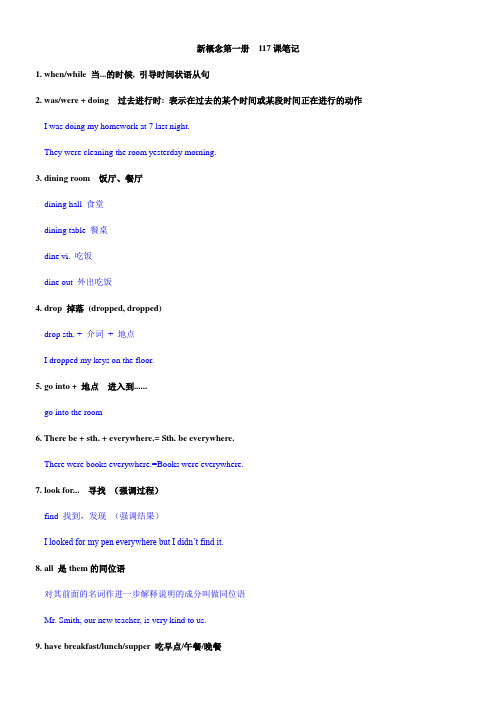
新概念第一册117课笔记1. when/while 当...的时候, 引导时间状语从句2. was/were + doing 过去进行时: 表示在过去的某个时间或某段时间正在进行的动作I was doing my homework at 7 last night.They were cleaning the room yesterday morning.3. dining room 饭厅、餐厅dining hall 食堂dining table 餐桌dine vi. 吃饭dine out 外出吃饭4. drop 掉落(dropped, dropped)drop sth. + 介词+ 地点I dropped my keys on the floor.5. go into + 地点进入到......go into the room6. There be + sth. + everywhere.= Sth. be everywhere.There were books everywhere.=Books were everywhere.7. look for... 寻找(强调过程)find 找到,发现(强调结果)I looked for my pen everywhere but I didn’t find it.8. all 是them的同位语对其前面的名词作进一步解释说明的成分叫做同位语Mr. Smith, our new teacher, is very kind to us.9. have breakfast/lunch/supper 吃早点/午餐/晚餐注意:三餐前不能有冠词the10. put sth. into... 把......放进......put the books into the bag11. both 两个都(1) 放在主语后边,作同位语,表示“两者都......”We both like English.(2) both of + 人称代词(宾格)Both of them 他们两个人=They both...注意:both用于两者,all 用于三者或以上,结构同both,他们的位置通常放be动词后实义动词前12. try to do sth. 试图做某事;努力做某事try doing sth. 尝试做某事13. 过去完成时:had + done过去完成时表示过去某一时间或动作以前已经发生或完成了的动作。
Lesson117(课件)新概念英语第一册
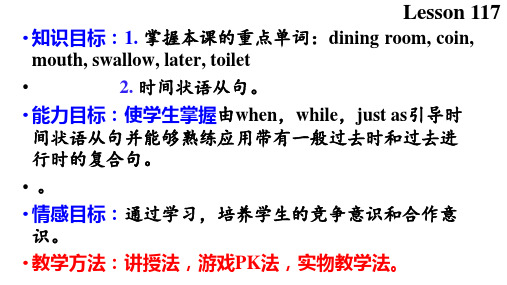
翻译下列句子。 • 1. 当我到达时,她正在做饭。 • When I __a_r_ri_v_e_d_, she_w_a_s___ _c_o_o_k_in_g_ a meal. • 4. 当我读书时,我妈妈正在做饭。 • _W__h_i_le____I was reading , • my mother __w_a_s_____ __c_o_o_k_i_n_g_____.
• A. him B. his
C. himself D. it
• (A) 4. Have you ever _______ Shenzhen?
• A. been to B. gone to C. went to
D. gone in
• (C ) 1. When he _______ I _______ a bath.
do housework
phone me from the office
一、选择题
• (C) 1. I _______ my pen everywhere but I couldn’t _______ it.
• A. looked for, found
B. found, looked for
• C. looked for, find
•。
• 情感目标:通过学习,培养学生的竞争意识实物教学法。
翻译下列句子。 • 1. 当我到达时,她正在做饭。 • When I ________, she______ _______ a meal. • 2. 当我读书时,我妈妈正在做饭。 • _________I was reading , • my mother _________ _____________.
While ... have breakfast, Tommy, find two small coins
新概念英语第一册Lesson117~122课文注释

新概念英语第一册Lesson117~122课文注释新概念英语第一册Lesson117~118课文注释1 在英文中表示过去某时正在进行的动作,要用过去进行时。
与现在进行时相比,过去进行时的区别就在于要用be 的过去式。
过去进行时的例子有:When my husband was going into the dining room this morning…;While we were having breakfast…等。
2 them all, all用来强调每一个硬币。
从语法上来讲,all是them的同位语。
紧跟在一个名词或代词后,进一步说明前面名词或代词是谁或什么东西的名词或代词,叫同位语。
3 our little boy, Tommy.Tommy是boy的同位语。
4 put them both…both是them的同位语。
5 we both...both是we的同位语。
6 Tommy had already swallowed them!句中用了过去完成时。
过去完成时用来表示两个动作中,发生在前的那个动作。
显然,句中“咽下硬币”的动作发生在夫妇俩能够把硬币从汤米手中抢过来之前。
7 later that morning 那天上午的晚些时候。
later是副词late的比较级。
8 any changechange是个多义词,既有“零钱”的意思,也有“变化”的意思。
此处既可指“硬币”,亦可指“情况的变化”。
这是“双关”修辞法。
新概念英语第一册Lesson119~120课文注释1 as quickly as they could是状语,修饰ran away。
第1个as是副词,第2个as是连词.引导比较状语从句。
could后省略了run,是“能跑多快就跑多快”的意思。
2 What’s up?干什么?有什么事?3 he calledhe指parrot。
英语中,动物有时用he或she代替,是“拟人”的写法。
新概念英语第一册Lesson117-118笔记(语法点+配套练习+答案)

put ... into ...
把...放到
have/has been to
曾去过某地
四、语法解析
1.现在进行时:说话此刻正在发生
结构:be (am/is/are) + v.ing
时间标志词:Look! Listen! now, at the moment
练习:
1.One of themis taking(take) photos for us now.
11.Didyoufinish(finish) your homework yesterday?
12.Her motherdidn’t give(not give) the girl any present.
13.When hewent(go) back to England, hewass(be) very tired.
The childrenwereallhappy.
Bothof the twins wanted to go to the theatre.
Allof my classmates are invited to my party.
three times三次
现在完成时的标志词
twice两次
once一次
have/has been to去过某地,已回
have/has gone to去了某地,未回
My father isn't at home, hehas gone toBeijing.
Mr Wang isn't here.Hehas gone toQingdao.
My fatherhas been toBeijing twice.
Ihaveneverbeen tothe Great Wall.
新概念英语第一册第117课Lesson117课文单词知识点

Lesson117When my husband was going into the dining room this morning, he dropped some coins on the floor.There were coins everywhere. We looked for them, but we could not find them all.While we were having breakfast, our little boy, Tommy, found two small coins on the floor.He put them both into his mouth. We both tried to get the coins, but it was too late. Tommy had already swallowed them!Late that morning, when I was doing the housework, my husband phoned me from the office.'How's Tommy?' he asked. 'I don't know,' I answered, 'Tommy's been to the toilet three times this morning, but I haven't had any change yet!' 今天早晨我丈夫走进饭厅时,把一些硬币掉在地上了。
到处都是硬币。
我们虽然找了,但没有把它们全部找到。
正当我们吃早饭时,我们的小男孩汤米在地上找到两枚小硬币。
他把这两枚硬币全都放进嘴里。
我们俩都试图把这两枚硬币拿出来,但太迟了。
汤米已经把硬币咽了下去!那天下午的晚些时候,当我正做家务时,我丈夫从办公室打来电话。
新概念英语第一册117课课件
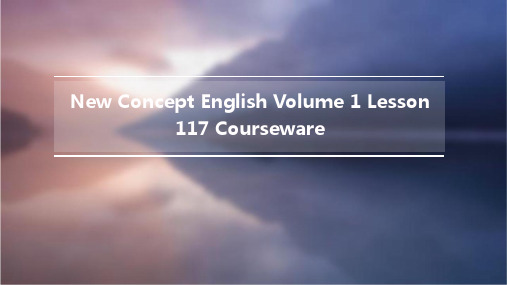
Words and expressions
The text includes a variety of useful vocabulary and expressions related to learning English.
04
reading comprehension
Reading materials
Text
"The Olympic Games"
Background information
The history and development of the Olympic Games, the significance of the Games in modern society, and the role of the Olympics in promoting global peace and friendship.
Some examples of words and expressions are: "global language," "interconnected world," "essential," "communication," "learning curve," "fluency," "conversational skills."
01
Sorting out the content of the text
Topic of the text
The topic of the text is about the importance of learning English.
新概念英语第一册117课课件资料ppt

housework, my husband telephoned me from the
office.
earlier
早些时候
给某人打电话
该句为when 引导的时间状语从句
主句为一般过去时表示比较短晢的动作或事情
‘How’s Tommy ?’he asked . ‘I don’t know ,’I answered . ‘Tommy’s been to the toilet three times this morning , but I haven’t had any change yet .
but连接的并列句
has been to 去过某地 time 次数,(可数): three times > twice > once change 零钱 = coin Change 变化 双关语 yet 用于完成时的否定句和疑问句中。
Phrases
1. go into… 2. go out of… 3. look for
Later that morning ,when I was doing the housework ,Bill phoned me from
the office .
过去进行时表示
后来,晚些时候 later that morning,
从句
when I
w过as去正d 在o i进n行g的动t作he。
Focus on grammar
We looked for them, but we could not find them all.
While we were having breakfast, our little boy, Tommy, found two small coins on the floor.
新概念英语lesson117
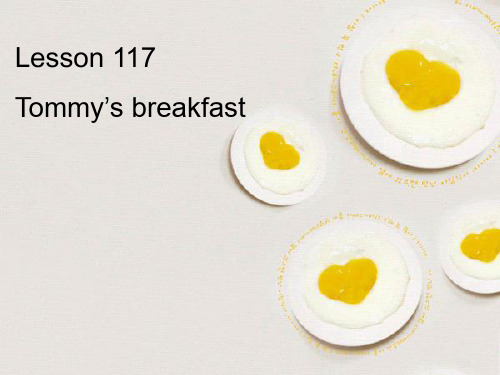
Why is an empty purse always the same? There is no change in it. (零钱,变化 零钱, 零钱 变化)
Translation
1)别把你的秘密告诉她。她说话嘴松。(秘密 secret) )别把你的秘密告诉她。她说话嘴松。(秘密 。( ) 2)昨天,当电话响起时,我正在做饭。 )昨天,当电话响起时,我正在做饭。 3)当我回到家的时候,他没有在读报纸。 )当我回到家的时候,他没有在读报纸。 4)昨天下午三点半,你正在卧室里读书吗? )昨天下午三点半,你正在卧室里读书吗?
‘How's Tommy?’he asked. ‘I don't know,’ I answered, ‘Tommy's been to the toilet three times this morning, but I haven't had any change yet!’
“汤米怎么样?”他问。 “我不知道,”我回答说, 汤米怎么样? 他问。 我不知道, 我回答说, 汤米怎么样 今天上午汤米去了3次厕所了 次厕所了, “今天上午汤米去了 次厕所了,但我还没看到硬 币!”
Lesson 117 Tommy’s breakfast
New words and expressions
dining room coin mouth swallow later toilet
饭厅 n.硬币 硬币 n.嘴 嘴 v.吞下 吞下 adv.后来 后来 n. 厕所,盥洗室 厕所,
dining room dining table sitting room / living room bedroom kitchen balcony garden
新概念英语第1册117课

JIM:Look! Everyone's in the garden. CAROL:Hello, Helen. Hello, Jim. TOM:Everybody wants to have lunch in the garden.
It's nice and warm out here. CAROL:Come and have something to drink. JIM:Thanks, Carol. May I have a glass of beer
• dining room
• coin
n.
• mouth
n.
• swallow v.
• later
adv.
• toilet
n.• ring源自v.饭厅 硬币 嘴 吞下 后来 厕所 响
Key words&expressions
★ coin n. 硬币 (note 纸币)
toss a coin
★ 掷硬币(打赌正面或反面)
dining room toilet
mouth
coin ring
swallow later
toilet coin swallow
later
Questions on the text
• What does she mean by ‘change’ in the last sentence?
Video
Key words&expressions
★ later
1) adv. 后来,较迟地,较后地 • three days later 三天后 • He came later than usually.他比平常来得晚。 • See you later. 回头见,再见。 • sooner or later 早晚,总有一天
新概念英语第一册117课 课件(共17张PPT)
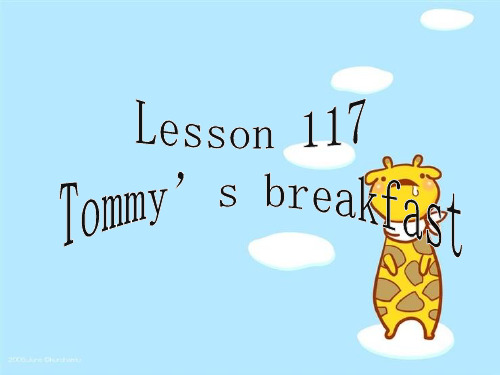
• 5. The train left when I was buying the tickets.
• 6. It rained heavily when I was driving to London.
A. is having B. have C. has D. was having
4. What ____ you ____from 7 to 9 yesterday ? A. were, doing B. did. do C. have, done
5.Look! Lily with her sister __ a kite on the playground.
shaving
cut
Exercise P239
• 1. He knocked at the door when I was answering the phone.
• 2. He came downstairs when I was having breakfast.
• 3. The phone rang when I was washing the dishes.
过去进行时VS现在进行时
结构
现在am/is/are+v-ing 过去was/were+v-ing
The students are drawing pictures now.
The students were drawing pictures when the teacher came in.
3.时间状语:
New words and expressions
dining room
新概念英语第一册Lesson-117-118

Lesson 117 - Tommy’s breakfast & Lesson 118 - What were you doing?知识点:1、When my husband was going into the dining room this morning, he dropped some coins on the floor.句型:当某事发生的时候,发生了某事。
用when引导的时间状语从句。
过去进行时:强调在过去某个时间正在发生的事。
was/were + doing2、There were coins everywhere.【回顾Lesson 115】复合不定代词。
3、We looked for them, but we could not find them all.look for 寻找,强调动作。
look是不及物动词。
find 找到,强调结果。
find是及物动词。
例句:He looked for his pen everywhere, but he couldn’t find it.这里的all放在代词them的后面,作them的同位语,补充说明。
them all = all of them 同位语用来表示其具体内容。
例句:We all like this movie. = All of us like this movie.4、While we were having breakfast, our little boy, Tommy, found two small coins on the floor. 句型:在某事发生的同时,发生了某事。
用while引导的时间状语从句。
例句:While my father was watching TV, my mother was cooking这里的, Tommy, 是our little boy的同位语,补充说明。
5、He put them both into his mouth.both 两者都。
新概念英语第一册Lesson 117

2. Penny __ dinner when she cut her fingers. A. had B. having C. was having D. is having KEY: C
3. While we ___ (wait) for the bus, a girl ___(run) up to us. 4. I ___ (telephone) a friend when Bob ___ (come) in. 5. While mother ___(put) Cathy to bed, the door bell ___ (ring). 6. Jane___(wait) for me when I___(arrive). 7. Mike and I___(play) basketball at that time yesterday afternoon.
• 常用时间状语 When, while, a moment ago, from nine to ten last evening, at that time • when既指时间点,也可指一段时间, while只指 一段时间,因此when引导的时间状语从句中的 动词可以是终止性动词,也可以是延续性动词, 而while从句中的动词必须是延续性动词。 I was having dinner when he came in. He came in when I was having dinner While I was having dinner, he came in. Mom was reading while Dad was watching TV.
7. Little和small little当“小”的意思时指的是“小而可 爱” a little girl. small指的是尺寸,数量型号上的“小”, 没有感情色彩。 a small box 8. both 两者都…… 两个或两个以上用all Both of us are students. We are both……。 All of us are students. We are all……。
新概念英语第一册第117课完整ppt课件

阅读课文回答问题
What does the she mean by ‘change’ in the last sentence ?
精选ppt
再看一遍课文
精选ppt
When my husband was going into the dining room this morning
精选ppt
续的或同时发生的,那么主从句的动词都可用过去
进行时。
精选ppt
本课语法过去进行时
1.过去进行时由“主语+was/were+动词ing”构成 2.过去进行时的否定式由“主语+was/werenot+现 在分词”构成 3.过去进行时的疑问式由“was/were+主语+现在 分词”组成 句型 肯定句=主语+was/were+doing+其它 否定句=主语+was/were+not+doing+其它 一般疑问句问语=Was/Were+主语+doing+其它 答语:Yes,Iwas/were.或No,Iwasn't/were’t. 特殊疑问句=特殊疑问词精+选p一pt 般疑问句+其它
精选ppt
本课语法
1.look for,寻找(强调动作过程);find,找到(强调寻找的结 果)。 2.Tommy had already swallowed them! 汤米已经把硬币咽了下去 句中用了过去完成时形式 had swallowed。过去完成时用来表示过去 两个动作中发生在前的那个动作。显然,句中咽下硬币的动作发生在 夫妇俩能够把硬币从汤米手中抢过来之前。 3.later that morning,那天上午的晚些时候。 later是副词late的比较级。 4.any change change是个多义词,既有“零钱”的意思,也有“变化”的意思。此 处既可指“硬币”;也可指“情况的变化”。这是双关(pun /p)n/) 修辞法。
新概念英语口语第一册 Lesson 117 Have Breakfast 吃早餐
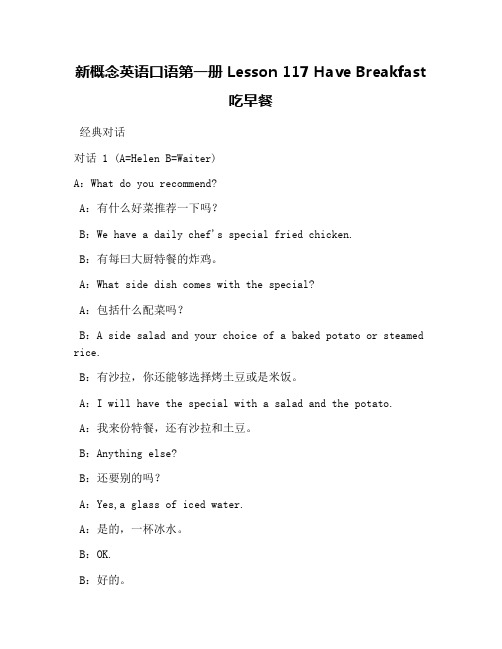
新概念英语口语第一册 Lesson 117 Have Breakfast吃早餐经典对话对话 1 (A=Helen B=Waiter)A:What do you recommend?A:有什么好菜推荐一下吗?B:We have a daily chef's special fried chicken.B:有每曰大厨特餐的炸鸡。
A:What side dish comes with the special?A:包括什么配菜吗?B:A side salad and your choice of a baked potato or steamed rice.B:有沙拉,你还能够选择烤土豆或是米饭。
A:I will have the special with a salad and the potato.A:我来份特餐,还有沙拉和土豆。
B:Anything else?B:还要别的吗?A:Yes,a glass of iced water.A:是的,一杯冰水。
B:OK.B:好的。
对话 2 (A=Emily B=Lucy)A:I'm famished.A:我要饿死了。
B:Me too. It's my treat. What are you in the mood for?B:我也是,今天我请客,你想吃什么?A:I think I want two steaks and a glass of milk. I can wolf down an elephant.A:我要两份牛排,一杯牛奶。
我能呑掉一头大象。
B:You really have a wolf in your stomach. I'd like one steak,a glass of orange juice and two doughnuts.B:你胃口是够大的,我要一份牛排、一杯橙汁、两个炸饼圈。
A:Ah,this steak is great. It really fills the bill.A:啊,牛排好棒啊,正合我的胃口。
新概念英语第一册课文翻译及学习笔记Lesson117
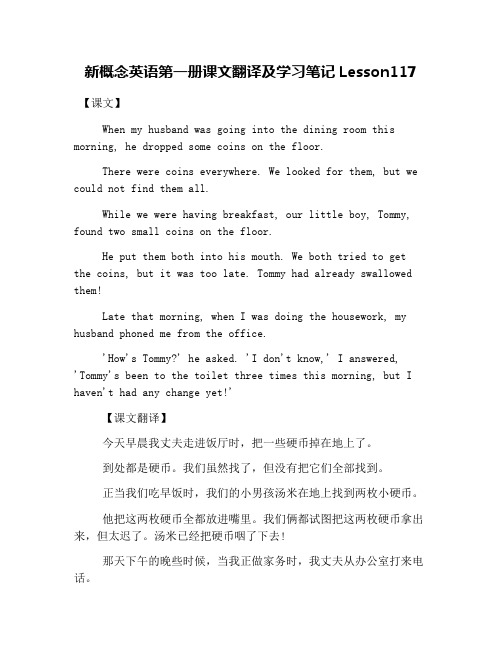
新概念英语第一册课文翻译及学习笔记Lesson117【课文】When my husband was going into the dining room this morning, he dropped some coins on the floor.There were coins everywhere. We looked for them, but we could not find them all.While we were having breakfast, our little boy, Tommy, found two small coins on the floor.He put them both into his mouth. We both tried to get the coins, but it was too late. Tommy had already swallowed them!Late that morning, when I was doing the housework, my husband phoned me from the office.'How's Tommy?' he asked. 'I don't know,' I answered,'Tommy's been to the toilet three times this morning, but I haven't had any change yet!'【课文翻译】今天早晨我丈夫走进饭厅时,把一些硬币掉在地上了。
到处都是硬币。
我们虽然找了,但没有把它们全部找到。
正当我们吃早饭时,我们的小男孩汤米在地上找到两枚小硬币。
他把这两枚硬币全都放进嘴里。
我们俩都试图把这两枚硬币拿出来,但太迟了。
汤米已经把硬币咽了下去!那天下午的晚些时候,当我正做家务时,我丈夫从办公室打来电话。
新概念英语第一册117课课文

第一部分:课文内容概述1. 本课文的主题是关于一个英国青年在拉夫堡市的一天生活。
课文通过描述这位青年的早晨起床、上班、和同事聊天的情景,展现了英国人的日常生活和工作状态。
2. 文中描绘了拉夫堡市的风景和周围环境,给人一种宁静和美好的感觉。
3. 整篇课文语言简洁明了,句式通顺,适合英语初学者阅读。
第二部分:课文详细内容分析1. 课文描述了主人公早晨起床的情景。
他在床边的一张小桌上放着一本书,表明他是一个勤奋好学的年轻人。
2. 主人公走进浴室刷牙洗脸,整洁的卫生间和洁净的毛巾显示了他对生活的态度。
3. 主人公穿着整洁的衣服,准备去上班。
他走出家门,沿着宁静的小路前行,远处是美丽的风景,仿佛展现了英国乡村的宁静和祥和。
4. 在工作中,主人公和同事聊天。
他们谈论着工作和生活,频频爆发笑声,给人以轻松愉快的感觉。
第三部分:课文背景介绍1. 拉夫堡是英国一个古老的城市,位于英格兰中部,是一个具有悠久历史的城市。
城市周围的乡村风景秀丽,适合居住和度假。
2. 课文中描绘的主人公可能是一个在拉夫堡市工作或学习的年轻人,他的生活方式和工作状态反映了英国年轻人的一般生活状态。
3. 整个课文的背景可以让学习者更好地了解英国的社会环境和英国人的生活习惯,有助于提高学习者的英语阅读能力和语言水平。
第四部分:课文启示1. 通过学习这篇课文,读者可以了解到英国人的日常生活和工作状态,增加对英国文化的了解,丰富自己的英语词汇和语法知识。
2. 课文描述了拉夫堡市的风景和周围环境,可启发读者去感受自然之美,增加对英国风景的向往和热爱。
3. 阅读这篇课文可以培养学习者的阅读理解能力和语言表达能力,激发学习英语的兴趣,提高英语学习的自信心。
第五部分:总结回顾1. 新概念英语第一册117课的课文《A day in the country》通过对英国青年一天的生活进行描述,展现了英国人的日常生活和工作状态,同时描绘了拉夫堡市的风景和周围环境。
新概念英语第一册117课

1.While she TV,Penny-asleep-A.watches,was falling-B.w s watching,fell-c.was watching,was falling-D.watch,fe l-Practice Time-KEY:B-1名是2浴子~~
2.Penny-dinner when she cut her-fingers.-A.had-B.havi g-c.was having-D.is having-KEY:C-o-CHEES-31启是A2站浴子~~
e败合erS8aa1-Dining room hall-饭厅
Living room-起居室,客厅-Bedroom-oto:-卧室-ToY Box
Bathroom-洗浴室,卫生间-Better Homes and Gardens.-S为o0aL3龙co -solutions-Kitchen-厨房-INCLUDED
3.While we-waitfor the bus,a-girl runup to us.-4.-I t lephonea friend when-Bob comein.-5.While mother-put-C thy to bed,the door bell-ring.-6.Jane-waitfor me when I arrive.-7.Mike and I playbasketball at-that time ye terday afternoon.-1子是2站浴子
Time for listening!
AY-概念:-1、在过去某个特定的时间正在进-过去进行时-行或发生的动作-2、当过去的一个动作发生的时候E-另外一个动作正在进行。-造-2B141-欲哈lcb
结构-1、肯定句:主语+was/were+现在-分词-was having-breakfast-2、否定句 -主语+was/were not+现-在分词-They were not watching TV.-3、疑 句:wletter last night?
新概念英语NCE1_lesson117-118(共18页)课件

单词学习
• dinning room(hall) • coin • mouth • swallow • later • toilet
饭厅 n. 硬币 n. 嘴 v. 吞下 adv. 后来 n. 厕所,盥洗室
• coin n. 硬币 • a silver coin 银币 • 你能把这个一美元的纸币换成硬币吗? • Could you change the one-dollar bill into coin? • mouth n. 嘴 • Open your mouth. • 嘴里塞满食物时不要说话。 • Don’t talk with your mouth full! • It sounds funny in your mouth. • 这种话由你的口中说出来,听起来就很可笑。
• later • 1) adv. 后来,较迟地,较后地 • 回头见
• see you later. • 三天后
• t得晚。
• He came later than usual. • 2)adj. 较迟的,较后的,更近的。 • 我们搭晚一点的火车吧。
• Let’s take a later train.
• swallow • ① v. 吞下,咽下
• Tommy swallowed the coins. • ② v. 抑制,使不流露
• I tried hard to swallow my doubts. • 我强忍着不露出怀疑的神色。 • 她忍住没笑,静静地坐在那里。
• She swallowed a smile and sat there still. • ③ v. 吞并;侵吞 • 我们公司去年被一家美国公司吞并了。
- 1、下载文档前请自行甄别文档内容的完整性,平台不提供额外的编辑、内容补充、找答案等附加服务。
- 2、"仅部分预览"的文档,不可在线预览部分如存在完整性等问题,可反馈申请退款(可完整预览的文档不适用该条件!)。
- 3、如文档侵犯您的权益,请联系客服反馈,我们会尽快为您处理(人工客服工作时间:9:00-18:30)。
《新概念英语》第一册——Lesson 117 &118
1.词汇
(1)coin(n. 硬币), mouth(n. 嘴), swallow(v. 吞下), later(adv.
后来), toilet(n. 厕所,盥洗室)
(2)补充:mouthful(n. 满嘴的)
2.短语及固定搭配
dining room 餐厅
look for 寻找
family tree 家谱
put on 穿上(衣服)
have a seat 就座
3.语言点
(1)later that morning
later是副词late的比较级。
(2)any change
change是多义词,既有“零钱”的意思,也有“变化”的以上。
在这里既可以指“硬币”,也可以指“情况的变化”。
这是英语里的“双关”修辞法。
4.语法
(1)过去进行时:表示过去某个时间正在进行的动作。
如:When my husband was going into the dining r oom this morning …; While we were having breakfast…等。
(2)同位语:紧跟在一个名词或代词后,进一步说明前面名词或代词是谁或什么东西的名词或代词,叫同位语。
如:them all; our little boy, Tommy;
put them both…; we both…等。
(3)过去完成时:用来表示两个动作中,发生在前的那个动作。
如:Tommy had already swallowed them!“咽下硬币”这个动作发生在夫妇俩能把硬币从Tommy手中抢过来之前。
